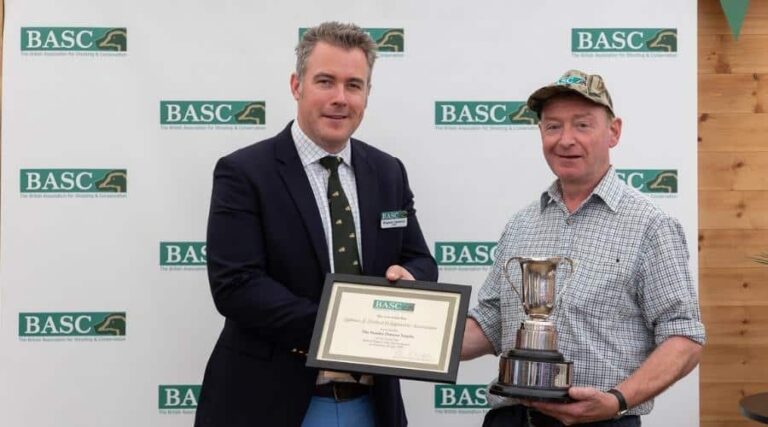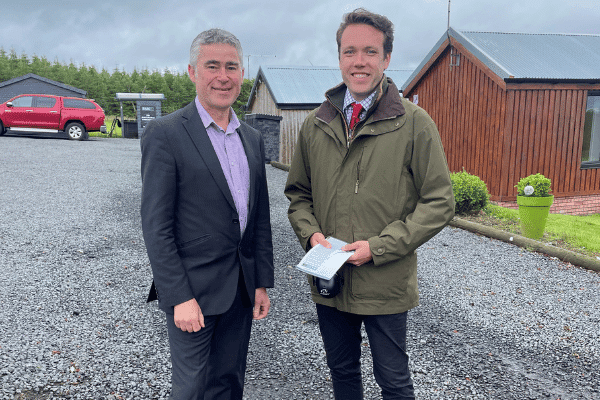
Ayrshire parliamentarians show support for sustainable ammunition
MP Alan Brown and MSP Sharon Dowey were trialling ammunition as part of the five-year voluntary transition towards a sustainable future for live quarry shooting.
Get information on the legal shooting season for mammals and birds in the UK.
Apply for funding for your project or make a donation today
Comprehensive information and advice from our specialist firearms team.
Everything you need to know about shotgun, rifle and airgun ammunition.
Find our up-to-date information, advice and links to government resources.
Everything you need to know on firearms law and licensing.
All the latest news and advice on general licences and how they affect you.
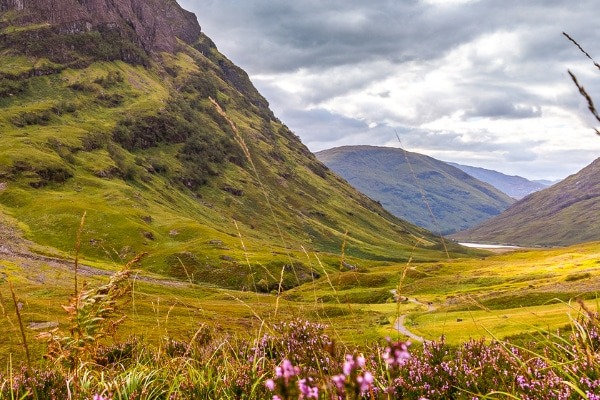

BASC’s newly appointed director of Scotland Peter Clark talks about his plans and the challenges facing shooting in Scotland and the UK.
I grew up on the family farm in rural Aberdeenshire, near Inverurie, where incidentally, most of BASC Scotland’s members live. From a young age, I adopted a love for country sports and conservation, whether it was out with my father’s gundogs or helping top up pheasant feeders with my grandfather.
Both my dad and grandfather are strong supporters of conservation on their farms, planting either shelter belts, game cover crops or creating wetlands. That work continues today, with the recent planting of woodland for the Her Late Majesty the Queen’s Platinum Jubilee last year, as part of the Green Canopy project. For them, farming, shooting and conservation are the ingredients that maintain the delicate balance of nature in the countryside.
My first ever memory of taking a keen interest in conservation was learning the Doric (local dialect to rural Aberdeenshire) names of birds out on walks to check the pheasant feeders with my grandfather. For the benefit of the non-Scots readers, a lapwing is a ‘peesie’, and a partridge is a ‘partrick’.
At school, I always enjoyed geography and when ‘rural affairs’ was chosen as the motion in the debating club, I made sure I was speaking. At university, I was an avid member of the clay pigeon shooting club, becoming president in my final year, with weekly trips to Auchterhouse near Dundee. For those of you of a certain age, I am sure you will remember the great fun had at the St Andrews Challenge and the infamous Welly Ball!
After graduating I worked in the Scottish Parliament as a rural policy advisor, developing policy and promoting agriculture, shooting and conservation, then I joined BASC as the public affairs manager for Scotland.
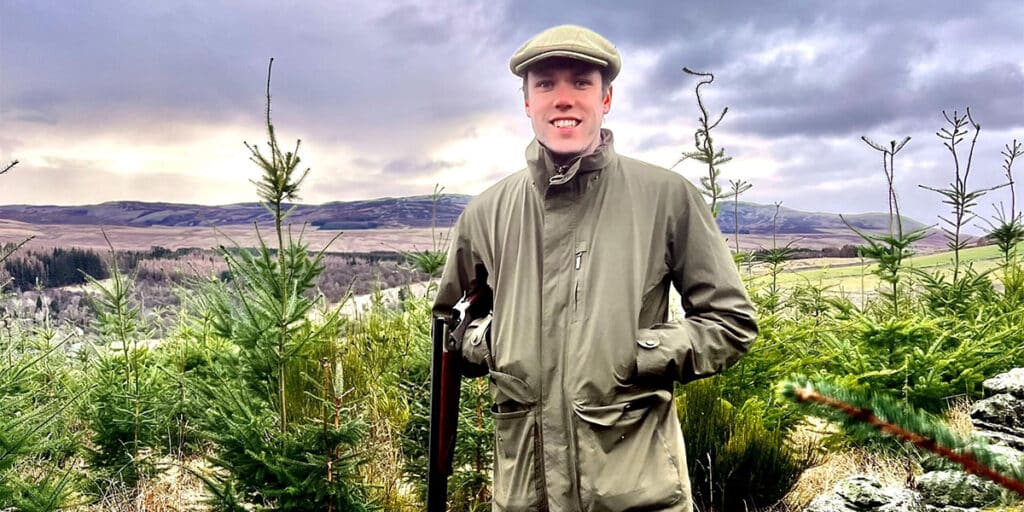
Without a doubt, walked up and driven game shooting. This is mainly on our family farm shoot or locally in Aberdeenshire or Angus, but I always enjoy shooting in different parts of Scotland and working my springer spaniel, Beth.
There is nothing quite like the comradery, community, and conviviality of shooters on a shoot day. Beaters, pickers up, keepers and Guns all assemble during the cold mornings in anticipation of a great day ahead, nothing quite beats it. It is undoubtedly an important part of rural life and being on a shoot day is like a countryside ‘tonic’, it is good for the body, soul and mind.
Most definitely it is a celebration of the culmination of the hard work that has gone into managing the shoot and the land throughout the year. Shooting across a wide range of different landscapes of Scotland and observing how the layout of shoots changes with landscapes is something which interests me greatly. It goes without saying, everyone knows their favourite drive.
Irrefutably, the enjoyment of shooting is being safe in the knowledge that you will return home with a brace of pheasant, partridge, or other game. This can then be shared with friends and family as a hearty and warming dish. More on that later!
I also have a keen interest in deer stalking and looking forward to completing my DSC1.
I am a fervent defender of the countryside, whether it is shooting, farming or the very essence of rural life. I remember, as a child, when the countryside descended on the streets of London in a show of defiance against the government, under the banner of ‘Liberty and Livelihood’, in opposition to the fox hunting ban. That was where my drive to influence politics was born.
Naturally, BASC shared those values and I saw the positive impact that our political lobby was having across the UK. I decided to work for BASC and take up the position of public affairs manager for Scotland.
The role was challenging but highly rewarding. We are very lucky in Scotland to be very close to MSPs and MPs. They are accessible and want to work with us. I have enjoyed the stories politicians tell me of how they have started clay pigeon shooting or learned to cook game or venison after meeting BASC.
What is important for us is to convey what we do, and how legislative changes affect our way of life. Having worked in the Scottish Parliament as a rural policy advisor and office manager to the shadow cabinet secretary for rural affairs, I know what information MSPs and MPs require to make better decisions.
There will be many challenges ahead, that is for sure. However, I am here to continue the good work of BASC in Scotland and stand up for shooting and conservation at every turn. From rewilding to licensing, we cannot escape the challenges facing shooting right now.
Crucially, the aim to protect shooting starts by influencing decision-making at the very heart of government. Having worked in the corridors of power, I know that engaging effectively with Ministers and parliamentarians, can have a direct influence on the policy and legislation that impacts on shooting and conservation.
I am looking forward to continuing to meet members and the fight to protect shooting in Scotland. With a packed game fair and agricultural show programme now complete, it has been great to catch up with old and new faces.
We have some exciting plans ahead to host new members’ events, right across Scotland, including those for the next generation of members. I believe, with the fantastic team in Scotland, we have a great chance to expand BASC Scotland and for it to flourish.
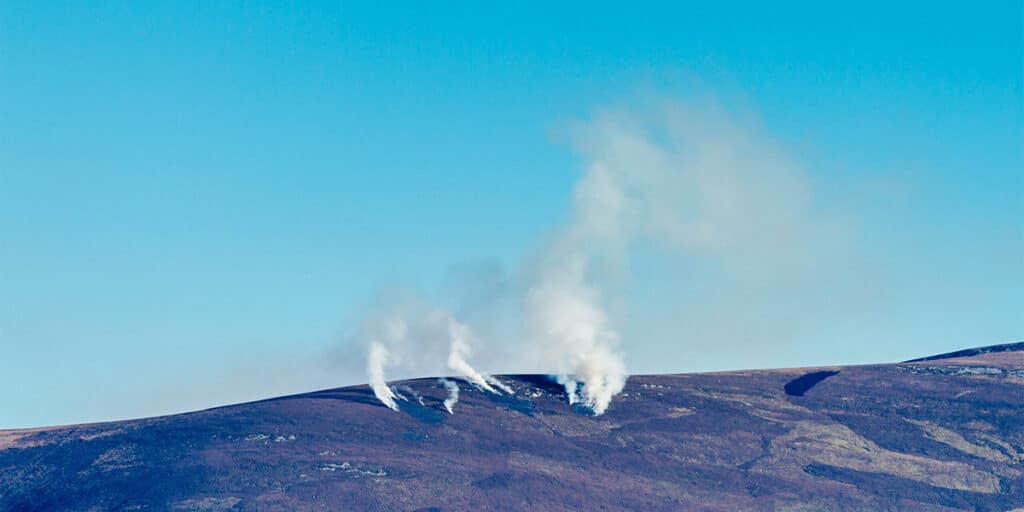
The controversial and complex Wildlife Management and Muirburn (Scotland) Bill is nothing short of a legislative sledgehammer to crack a nut.
Introduced as part of the recommendations provided to the Scottish Government through an independent review known as the Werritty Review on grouse moor management, it goes far beyond the review’s initial remit. With its various licensing schemes, it could pose challenging financial and administrative ramifications for rural communities as well as restrict shooting of some gamebird species.
The licensing scheme is deeply flawed, as licences can be suspended or revoked easily, through the non-adherence to an as-of-yet-unpublished code of practice and would only last for one year.
Frankly, the bill’s disproportionality risks significant collateral damage to rural communities right across Scotland. Being deterred by a licence application or losing the right to shoot grouse, could result in immediate financial loss for the licence holders, but it also has far-reaching consequences for the loss of rural jobs and the wider rural economy.
The pronounced effect on the rural supply chain could lead to the loss of village pubs, hotels, shops, and jobs moving out of the glen. We know that 60 to 80 per cent of direct spending from grouse shooting occurs within the local or regional area.
Fundamentally, the bill’s impact will considerably slow and, in some cases, stall efforts towards enhancing biodiversity and conservation measures, not only in the uplands but in lowland areas, too. It goes directly against the goal of the Scottish Government 2030 Biodiversity Strategy, and the shooting sector’s drive to see successful land management resulting in landscapes abundant in wildlife, rich in biodiversity, contributing to Scotland’s net-zero journey and capable of sustaining rural communities for generations ahead.
BASC led a successful campaign, encouraging members to respond to the Scottish Parliament’s call for views on the bill itself. The weight of public opinion from the consultation showed that people opposed further grouse shoot regulation and licensing, as well as muirburn licensing.
It is imperative rural voices are heard, not only to prevent the passing of unworkable legislation but also to protect shooting, conservation and the sustainability of remote and rural communities.
We will be back in Holyrood in September putting the facts and positive arguments towards the MSPs about the bill’s flaws.
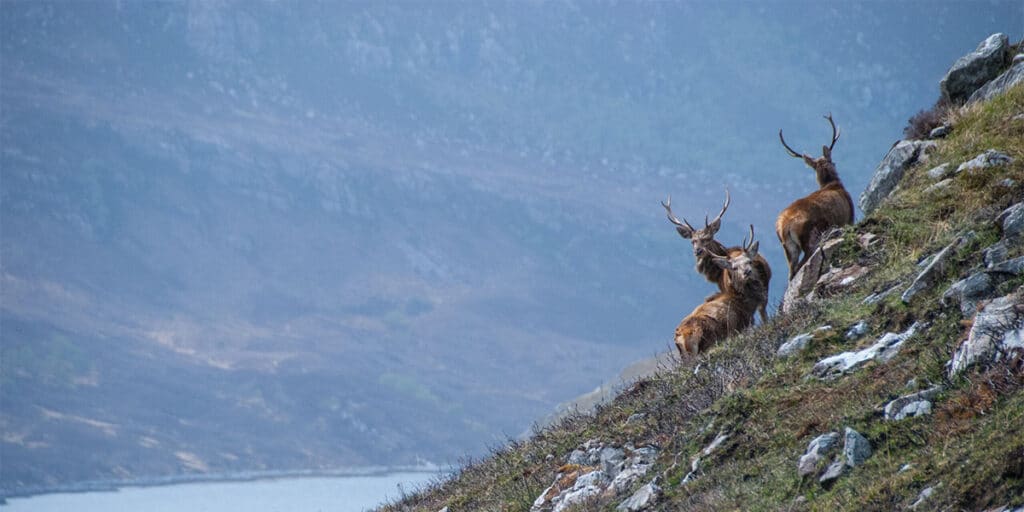
Deer legislation is changing in Scotland. The Scottish Government’s deer management consultation identified 99 suggestions for improvement to deer management in Scotland. Following its conclusion, NatureScot recently announced the first three legislative changes that will come into play this year.
The first of these is for the close seasons for all male deer in Scotland to be removed from 21 October. This means that male deer may be shot year-round in Scotland.
While we were against this proposal, we do accept that it may remove barriers to deer managers in some circumstances. Nevertheless, we continue to promote that, throughout the winter months, any deer manager’s priority should be achieving the female cull. For many, especially those commercially selling the shooting of male deer, the proposal will not change their established management plan. For instance, on the highly successful BASC Arran Stalking Scheme, the decision has already been made to keep the weeks stalking for members as dedicated stag weeks from August to September and hind weeks from November to February. The decision will ultimately be up to each management plan, situation and species.
The second change relates to the legalisation of thermal imaging and night vision rifle scopes for the taking of deer at night. These will now be permitted under licence, coming to effect from November 2023.
Lastly, the decision has also been made to reduce the minimum bullet weight needed to legally shoot red, sika and fallow deer in Scotland.
The minimum bullet weight will be reduced from 100gr to 80gr. This decision was made to allow deer managers to continue using .243 calibre and other similar cartridges with lead-free ammunition. This change will also come into effect in November.
The challenges facing shooting may seem overwhelming, and we are constantly bombarded on social media with negative stories and perceptions of our industry, which can be crushing, to say the least.
That said, I am confident we will overcome the challenges facing shooting by working hard and demonstrating the benefits through facts and evidence.
We have an uphill battle on our hands, but we have a very positive story to tell; we work hard to protect and enhance Scotland’s most cherished landscapes and we are very driven people.
As a sector, we must be better at harnessing these qualities and channelling that energy into persuading, influencing and educating people on the benefits of shooting and conservation. I know many BASC members do this brilliantly every day right across Scotland and the UK and I thank them for their fantastic efforts.
My message to all shooters is that BASC is here to support them through these tough challenges facing shooting. We will work tirelessly to ensure shooting and conservation has a sustainable, credible and bright future ahead for generations to come.
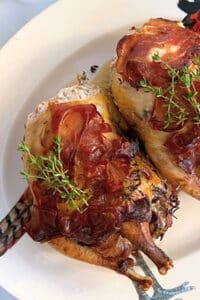 Game is so flavoursome and versatile, and it can be used fantastically as an alternative to other meat and poultry.
Game is so flavoursome and versatile, and it can be used fantastically as an alternative to other meat and poultry.
Given where I am from, I will always be a strong advocate of Aberdeen Angus Scotch Beef, but Scottish game meat, pheasant, pigeon and duck, as well as wild venison, all fundamentally possess the same key components of being local, nutritious, seasonal, and sustainable.
Having lived in Edinburgh, my challenge has always been to subtly introduce game and venison into dishes for some of my friends with no shooting or countryside background or interest. I find the game speaks for itself, and it is easiest to introduce when you cook everyday dishes with a game twist. These dishes are always met with a pleasant surprise, a positive reaction and a resultant clean plate.
I am now frequently asked ‘When are you shooting next, Peter? Can we have a brace of pheasants please?’ I’d like to think that’s a winning result for the Eat Game campaign.
I enjoy cooking and eating game and venison. However, I always end up using every pan/dish/utensil in the kitchen, resulting in a mountain of washing up to do after!
I will share my favourite recipe, which thankfully avoids this unfortunate scenario. It’s called Beretta pheasant, a nod to the Italian manufacturer of the shotgun I used to shoot the pheasant I used to make this dish for the first time. It’s an Italian twist on a classic roast pheasant. Most importantly, you only use one dish for it!
It is a great way to cook a whole bird, ensuring it remains moist, juicy and flavoursome.
You can find the Beretta pheasant recipe here.


MP Alan Brown and MSP Sharon Dowey were trialling ammunition as part of the five-year voluntary transition towards a sustainable future for live quarry shooting.
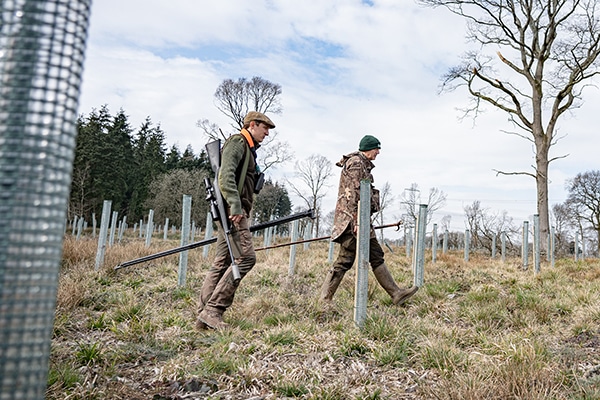
The Natural Environment (Scotland) Bill proposes increased regulatory intervention with little detail on financial incentives for deer managers.
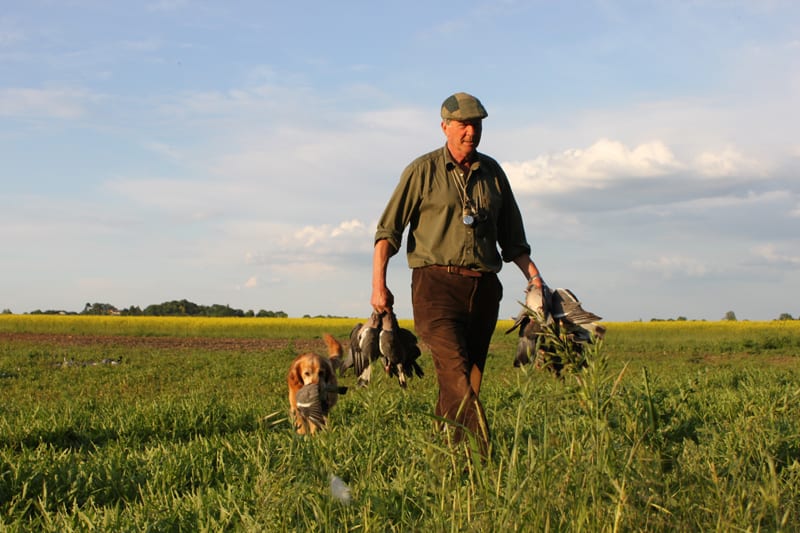
Scottish Natural Heritage has made last minute changes to the Scottish general licenses that will take effect from 1st January 2014. BASC is challenging the process and one of the decisions.
Without a doubt, walked up and driven game shooting. This is mainly on our family farm shoot or locally in Aberdeenshire or Angus, but I always enjoy shooting in different parts of Scotland and working my springer spaniel, Beth.
There is nothing quite like the comradery, community, and conviviality of shooters on a shoot day. Beaters, pickers up, keepers and Guns all assemble during the cold mornings in anticipation of a great day ahead, nothing quite beats it. It is undoubtedly an important part of rural life and being on a shoot day is like a countryside ‘tonic’, it is good for the body, soul and mind.
Most definitely it is a celebration of the culmination of the hard work that has gone into managing the shoot and the land throughout the year. Shooting across a wide range of different landscapes of Scotland and observing how the layout of shoots changes with landscapes is something which interests me greatly. It goes without saying, everyone knows their favourite drive.
Irrefutably, the enjoyment of shooting is being safe in the knowledge that you will return home with a brace of pheasant, partridge, or other game. This can then be shared with friends and family as a hearty and warming dish. More on that later!
I also have a keen interest in deer stalking and looking forward to completing my DSC1.
I am a fervent defender of the countryside, whether it is shooting, farming or the very essence of rural life. I remember, as a child, when the countryside descended on the streets of London in a show of defiance against the government, under the banner of ‘Liberty and Livelihood’, in opposition to the fox hunting ban. That was where my drive to influence politics was born.
Naturally, BASC shared those values and I saw the positive impact that our political lobby was having across the UK. I decided to work for BASC and take up the position of public affairs manager for Scotland.
The role was challenging but highly rewarding. We are very lucky in Scotland to be very close to MSPs and MPs. They are accessible and want to work with us. I have enjoyed the stories politicians tell me of how they have started clay pigeon shooting or learned to cook game or venison after meeting BASC.
What is important for us is to convey what we do, and how legislative changes affect our way of life. Having worked in the Scottish Parliament as a rural policy advisor and office manager to the shadow cabinet secretary for rural affairs, I know what information MSPs and MPs require to make better decisions.
There will be many challenges ahead, that is for sure. However, I am here to continue the good work of BASC in Scotland and stand up for shooting and conservation at every turn. From rewilding to licensing, we cannot escape the challenges facing shooting right now.
Crucially, the aim to protect shooting starts by influencing decision-making at the very heart of government. Having worked in the corridors of power, I know that engaging effectively with Ministers and parliamentarians, can have a direct influence on the policy and legislation that impacts on shooting and conservation.
I am looking forward to continuing to meet members and the fight to protect shooting in Scotland. With a packed game fair and agricultural show programme now complete, it has been great to catch up with old and new faces.
We have some exciting plans ahead to host new members’ events, right across Scotland, including those for the next generation of members. I believe, with the fantastic team in Scotland, we have a great chance to expand BASC Scotland and for it to flourish.
The controversial and complex Wildlife Management and Muirburn (Scotland) Bill is nothing short of a legislative sledgehammer to crack a nut.
Introduced as part of the recommendations provided to the Scottish Government through an independent review known as the Werritty Review on grouse moor management, it goes far beyond the review’s initial remit. With its various licensing schemes, it could pose challenging financial and administrative ramifications for rural communities as well as restrict shooting of some gamebird species.
The licensing scheme is deeply flawed, as licences can be suspended or revoked easily, through the non-adherence to an as-of-yet-unpublished code of practice and would only last for one year.
Frankly, the bill’s disproportionality risks significant collateral damage to rural communities right across Scotland. Being deterred by a licence application or losing the right to shoot grouse, could result in immediate financial loss for the licence holders, but it also has far-reaching consequences for the loss of rural jobs and the wider rural economy.
The pronounced effect on the rural supply chain could lead to the loss of village pubs, hotels, shops, and jobs moving out of the glen. We know that 60 to 80 per cent of direct spending from grouse shooting occurs within the local or regional area.
Fundamentally, the bill’s impact will considerably slow and, in some cases, stall efforts towards enhancing biodiversity and conservation measures, not only in the uplands but in lowland areas, too. It goes directly against the goal of the Scottish Government 2030 Biodiversity Strategy, and the shooting sector’s drive to see successful land management resulting in landscapes abundant in wildlife, rich in biodiversity, contributing to Scotland’s net-zero journey and capable of sustaining rural communities for generations ahead.
BASC led a successful campaign, encouraging members to respond to the Scottish Parliament’s call for views on the bill itself. The weight of public opinion from the consultation showed that people opposed further grouse shoot regulation and licensing, as well as muirburn licensing.
It is imperative rural voices are heard, not only to prevent the passing of unworkable legislation but also to protect shooting, conservation and the sustainability of remote and rural communities.
We will be back in Holyrood in September putting the facts and positive arguments towards the MSPs about the bill’s flaws.
Deer legislation is changing in Scotland. The Scottish Government’s deer management consultation identified 99 suggestions for improvement to deer management in Scotland. Following its conclusion, NatureScot recently announced the first three legislative changes that will come into play this year.
The first of these is for the close seasons for all male deer in Scotland to be removed from 21 October. This means that male deer may be shot year-round in Scotland.
While we were against this proposal, we do accept that it may remove barriers to deer managers in some circumstances. Nevertheless, we continue to promote that, throughout the winter months, any deer manager’s priority should be achieving the female cull. For many, especially those commercially selling the shooting of male deer, the proposal will not change their established management plan. For instance, on the highly successful BASC Arran Stalking Scheme, the decision has already been made to keep the weeks stalking for members as dedicated stag weeks from August to September and hind weeks from November to February. The decision will ultimately be up to each management plan, situation and species.
The second change relates to the legalisation of thermal imaging and night vision rifle scopes for the taking of deer at night. These will now be permitted under licence, coming to effect from November 2023.
Lastly, the decision has also been made to reduce the minimum bullet weight needed to legally shoot red, sika and fallow deer in Scotland.
The minimum bullet weight will be reduced from 100gr to 80gr. This decision was made to allow deer managers to continue using .243 calibre and other similar cartridges with lead-free ammunition. This change will also come into effect in November.
The challenges facing shooting may seem overwhelming, and we are constantly bombarded on social media with negative stories and perceptions of our industry, which can be crushing, to say the least.
That said, I am confident we will overcome the challenges facing shooting by working hard and demonstrating the benefits through facts and evidence.
We have an uphill battle on our hands, but we have a very positive story to tell; we work hard to protect and enhance Scotland’s most cherished landscapes and we are very driven people.
As a sector, we must be better at harnessing these qualities and channelling that energy into persuading, influencing and educating people on the benefits of shooting and conservation. I know many BASC members do this brilliantly every day right across Scotland and the UK and I thank them for their fantastic efforts.
My message to all shooters is that BASC is here to support them through these tough challenges facing shooting. We will work tirelessly to ensure shooting and conservation has a sustainable, credible and bright future ahead for generations to come.
Game is so flavoursome and versatile, and it can be used fantastically as an alternative to other meat and poultry.
Given where I am from, I will always be a strong advocate of Aberdeen Angus Scotch Beef, but Scottish game meat, pheasant, pigeon and duck, as well as wild venison, all fundamentally possess the same key components of being local, nutritious, seasonal, and sustainable.
Having lived in Edinburgh, my challenge has always been to subtly introduce game and venison into dishes for some of my friends with no shooting or countryside background or interest. I find the game speaks for itself, and it is easiest to introduce when you cook everyday dishes with a game twist. These dishes are always met with a pleasant surprise, a positive reaction and a resultant clean plate.
I am now frequently asked ‘When are you shooting next, Peter? Can we have a brace of pheasants please?’ I’d like to think that’s a winning result for the Eat Game campaign.
I enjoy cooking and eating game and venison. However, I always end up using every pan/dish/utensil in the kitchen, resulting in a mountain of washing up to do after!
I will share my favourite recipe, which thankfully avoids this unfortunate scenario. It’s called Beretta pheasant, a nod to the Italian manufacturer of the shotgun I used to shoot the pheasant I used to make this dish for the first time. It’s an Italian twist on a classic roast pheasant. Most importantly, you only use one dish for it!
It is a great way to cook a whole bird, ensuring it remains moist, juicy and flavoursome.
You can find the Beretta pheasant recipe here.
